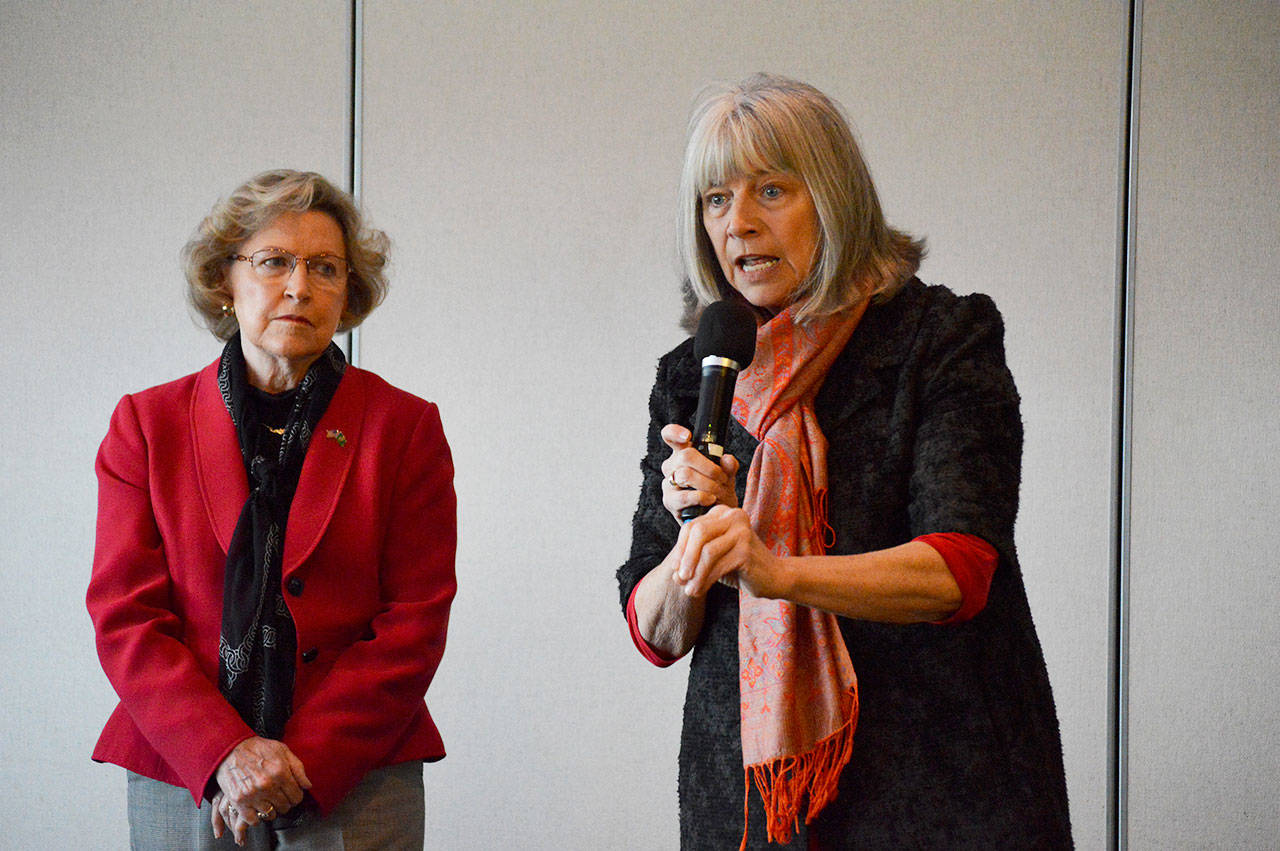State legislators spoke about net neutrality, big data brokers and carbon taxes on Jan. 20 at the Brunch with Our Legislators event, held by the League of Women Voters Whidbey Island and the American Association of University Women.
Sen. Barbara Bailey, R-Oak Harbor, and Rep. Norma Smith, R-Clinton, attended the event at the Whidbey Golf Club, and Rep. Dave Hayes, R-Camano, sent his legislative assistant in his place after he was called to work for the Snohomish County Sheriff’s Office.
Bailey, who is the Senate minority whip, spoke to her “no” vote last Thursday on the “Hirst Fix” bill, which is a water rights bill that had been holding up the state capital construction budget bill from passing.
“I felt like it was important to make a statement about that,” she said. “There are people in Skagit who own homes, have a well but cannot turn those wells on.”
The bill, which she voted against because of a lack of a fix for issues in Skagit county, passed in the Senate as did the capital budget. The water rights issues in the bill did not affect Island County.
Bailey also explained that she cannot hold a ranking position on any committees because of her leadership position within the Republican caucus.
Smith is the ranking member on the technology, energy and economic development committee and assistant ranking member of the capital budget committee. She recently introduced a bill to protect net neutrality in the state after the Federal Communications Commission ended the 2015 open-internet regulations. Her legislation would give the state attorney general the authority to enforce net neutrality in the state to prohibit internet service providers from blocking content, throttling traffic or favoring some traffic over others.
Bailey, after a question regarding the subject, said she was hesitant about “heavy handed government” with net neutrality. She said she wasn’t opposed to the legislations but wanted to be sure it didn’t come with excessive regulations.
Smith also introduced a bill to register “big data brokers,” who create databases about spending habits, demographic information and most other information that can be found online and sell this information.
“We need transparency,” said Smith. “We need to know who they are.”
After these brokers are registered, Smith intends to reintroduce legislation that would tax them.
“I believe, outside of human trafficking, we’ve never seen such one-way commerce in human history,” she said.
Another of Smith’s bills evaluates proposed energy solutions, such as a carbon tax, for their effect on energy rates. Hayes, in a letter read at the event, shared concerns over a carbon tax. He felt it would place undue burden on middle- and lower-class taxpayers and that there are better ways to address the problem.
“If we really want to be serious about reducing carbon, let’s reduce the fuel in our forests that have allowed wildfires to create immense carbon output in our state,” his letter stated.
Hayes’ top priority was a pilot program he introduced for a diversion center in Everett. The program will pair social workers with law enforcement officers,will then refer people who are suffering from addiction to the center in Everett. Those individuals would then be put into a housing and job training program and in patient facility to become clean.
“It is my belief that the way our public policy has dealt with addiction and behavioral health issues must change,” his letter said. “The revolving door at our jails and hospital emergency rooms for those suffering from addiction and mental health crises must stop.”
Smith said she was able to write the mental and behavioral health portion of the capital budget. She said the bill provides $26 million in funding for housing for the chronically mentally ill if they also have wrap-around services made available to them.
Asked about a recent court ruling on the Public Records Act, Bailey and Smith said their concern with the act was for their constituents who contact them with personal stories, especially regarding health care. A Thurston County judge ruled Friday that legislative leaders had violated the act by declining requests for records. The Legislature’s administrative offices have claimed they are exempt from the act for decades.
All the lawmakers demonstrated optimism for the current short session, especially with the passage of the capital budget.
“You’re hearing about what’s going wrong in politics, and there’s a lot of stuff going wrong,” said Smith. “I’m telling you, you need to be proud of your Washington state Legislature.”



